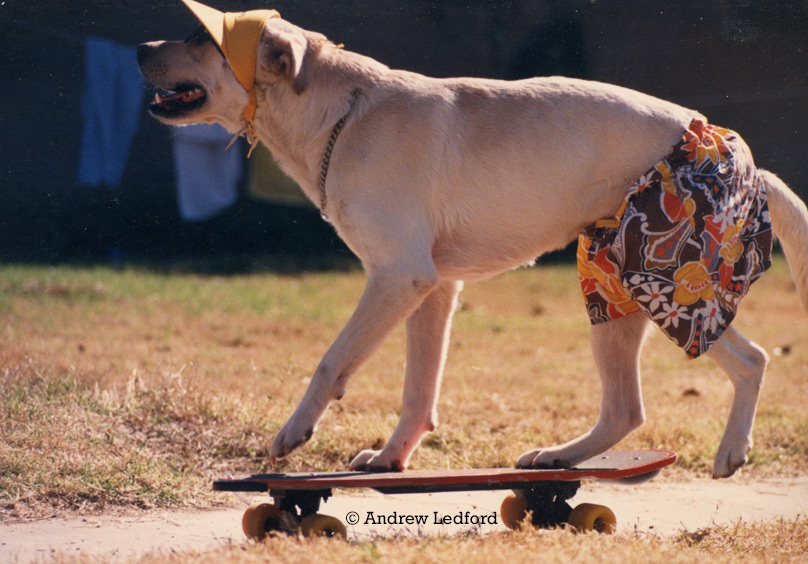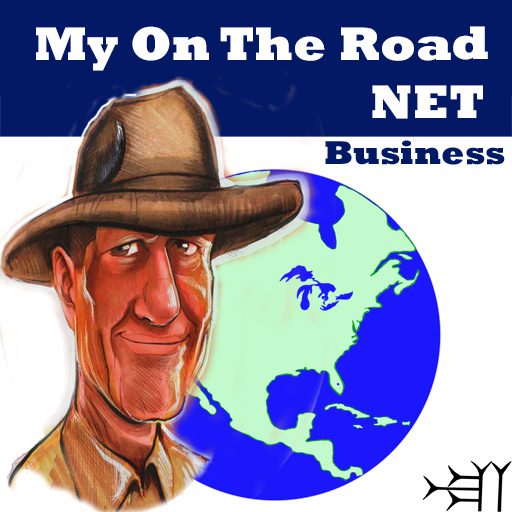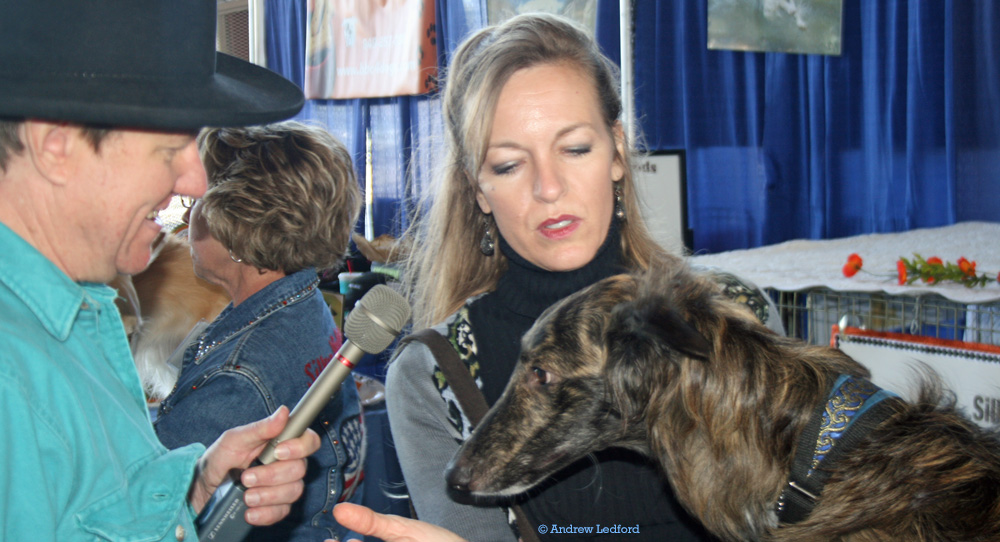Branded Entertainment
Branded entertainment can also be called branded content and some people also call it native advertising.
Branded entertainment is a fairly new category of content.
However, its roots go way back to the days of the branded musical shows of patented medicine peddlers. You can get a little bit of an idea how this worked by watching the first part of the Elvis Presley 1957 movie “Loving You.”
In the 1980s I was doing branded street performances with my movie dog and my local cable show “Just The Doggone Facts.” Both of these types of entertainment could be classified as Branded Entertainment. Even with its long history the term seems novel in today’s day and age. According to Wikipedia it became a recognized marketing technique in 2001.

This is my Movie, Television and Street performing dog. He was in several commercials, on TV, and in a film.
Me and my dog used to do street performances to promote my training business along with doing television commercials.
While branded entertainment can feature the brand as a central character, sometimes the content is so closely aligned with the brand’s values the brand doesn’t need to be seen. This is most often done in lifestyle content and lifestyle videos. Red Bull the maker of energy drinks is probably the leader in branded lifestyle media. While the Red Bull brand itself may not even be in the content the feel and personality of the brand is baked into each video.
With this type of content the brand is an integral part of the story. Without the brand the story would not exist or at least it would be significantly different. We can think of branded entertainment as an offshoot of content marketing.”
This is a wonderful use of a car show as experiential branded entertainment.
The definition of branded entertainment is not as clear as with some forms of content. When talking about branded content there is sometimes overlap between branded entertainment, long commercials (brand infomercials,) and sponsorships.
A good definition of branded entertainment:
”Entertaining content that captures the personality and essence of a brand and/or business.”
With this type of content the brand is an integral part of the story. Without the brand the story would not exist or at least it would be significantly different.
One important element in this art form is that it needs to have enough entertainment value that people want to watch it. We can think of branded entertainment as an offshoot of content marketing.”
Branded entertainment can take many forms and may involve most types of video formats from documentaries to scripted shows. Here is a partial list of some of the types of shows that can be used for branded entertainment – arced web series, docu-series, self-contained shows, live streaming, testimonial videos, reportage, animations, how-to videos, and even docusoaps.
I think of branded entertainment as entertainment that revolves around a brand, a brand’s property, a brand’s message, narrative, or values the brand stands for, as well as the brand’s place in popular culture.
Branded entertainment is the kind of marketing I started developing in the mid-1980s and I’ve been advocating this form of entertainment marketing since 1999.
One key aspect to this type of media is for companies to create highly rewarding content that people want to consume. Creating valuable and relevant entertainment/information that people want to see usually requires making content that is not overly commercial
One of my favorite examples of branded entertainment from the past is Mutual of Omaha’s Wild Kingdom. I think the official title of this program is Wild Kingdom, but to me it will always be Mutual of Omaha’s Wild Kingdom. I grew up watching and loving this show. Mutual of Omaha’s Wild Kingdom is done more as a sponsorship, but it was done with such good branding that I will always associate the show and the brand and therefore qualifies as a type of branded entertainment.
Branded entertainment is more than product placement. While product placement does not necessarily make a story branded entertainment, product placement can be part of the branded media ecosystem. Using entertainment as branding involves more than adding a storyline to a commercial. The relative newness of this media form has encouraged production companies and ad agencies to call any ad with a storyline branded entertainment.
A good measurement for this type of branding and promotion is its overall entertainment value. Is it good enough that people want to consume the content as an end in itself? Next we need to ask, does it meet the need it was created for? What is the purpose of this story/content? Is the content to develop brand recognition or is it for lead generation? These shows can also be used primarily as branding for a company. Branding can be useful in capturing market share and supporting the sales force, resellers, and retailers.
An example would be developing content that keeps the company’s brand top of mind for fans when visiting retail establishments.
As over the air television loses market share, Over The Top TV (OTT TV) and online video are gaining top of mind relevance, even the most entrenched CEOs realize that television has lost audience share to a fragmented online and streaming video ecosystem.
In the new age of digital media with ad skipping and ad blocking software, TV type ads have become less effective. As TV ads decline in value more brands are looking for a better way to get their message out. The nice thing about online video is that it is much more targeted. With a smaller audience comes better segmentation.
In the current media climate with consumers desiring authenticity and a general suspicion of all thing advertising, media viewers are shifting the way they consume media and brand messages. Brands and businesses live in a world where traditional interruption advertising is no longer as effective as it once was. Most of a business’s potential customers have been battered with so much advertising that they no longer think it provides value. Advertising can be off putting, even when there is a need for the product or service.
Not only is there ad blindness, but we also have some fairly effective ad blockers. To make things worse there is a new phenomenon called ad annoyance. Yes, that’s right, your ads can actually make some people dislike the brand because they find the brand’s ads annoying. This cultural shift to anti ad technology and attitudes has many brands trying to figure out how to get their message to potential customers. What brands need to do is stop thinking about bombarding customers with more intrusive advertising, delivered in more annoying ways. Instead brands should start thinking of potential customers as an audience and cultivate them with entertainment, information and dialogue.
Toyota, prefers to call this type of brand promotion “brand partnership.” Other companies like to use the term underwriting. PBS already uses underwriting as a code word for sponsorship. PBS underwriting is quite similar to Mutual of Omaha’s sponsoring the Wild Kingdom, although a bit less obvious.
The secret to this form of marketing is to replace interrupting a reinforcing experience with integrating the brands message into the reinforcing experience. The message needs to become the entertainment and the content needs to be audience/fan focused. One problem with advertising is that it’s brand focused, it’s all about the brand and it’s all about selling. Most people don’t care about what the brand wants and they certainly don’t like brands trying to manipulate them with sales tricks. Audiences care about satisfying their own desires and needs. Branded content is designed to please audiences while accomplishing brand objectives. It is my personal belief that branded content should be authentic and not manipulative. It should respect the audience and fans as partners. What I have observed is that too often the audience is treated as an enemy that needs to be conquered with deception and manipulation.
If you’re interested in learning more about how my style of Branded Entertainment and online video can help your business, give me a call. I am also available to host unscripted video or TV series.
Call me, Andrew Ledford, at:
(562) 423-1691
To discuss the wonderful world of content marketing and video.

